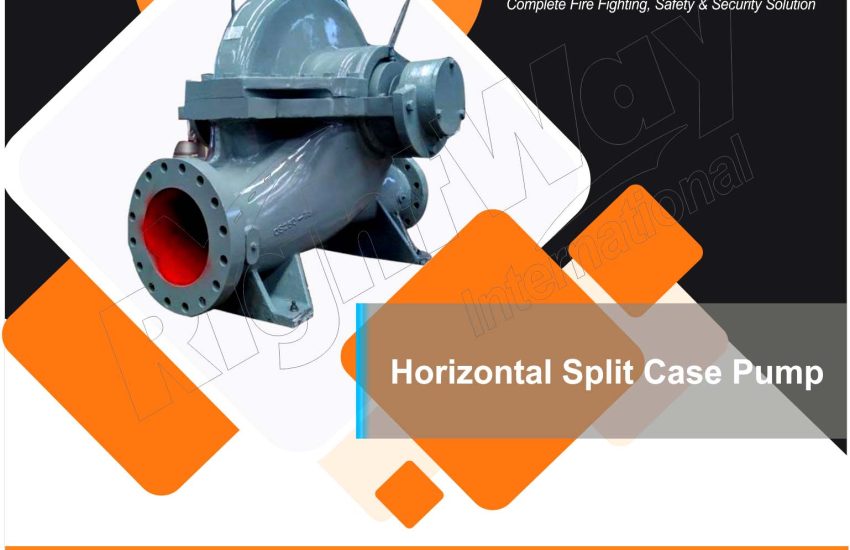Horizontal Split-Case Pump are a type of centrifugal pump renowned for their robust design, efficiency, and ease of maintenance. These pumps are commonly used in a variety of applications, including water supply, fire protection, HVAC systems, and industrial processes. This article provides an in-depth look at horizontal split-case pumps, covering their design, operation, applications, and advantages.
How Horizontal Split-Case Pumps Work
Horizontal split-case pumps operate on the principle of centrifugal force. Here’s a detailed explanation of their operation:
- Water Inlet: Water enters the pump through the suction port, which is located on one side of the pump casing.
- Impeller Rotation: The impeller, a rotating component with blades, spins rapidly to create centrifugal force.
- Centrifugal Force: This force moves the water outward from the impeller towards the pump casing’s outer edges.
- Pressure Increase: As the water moves outward, its velocity and pressure increase.
- Discharge: The high-pressure water exits through the discharge port on the opposite side of the pump casing.
Design Features of Horizontal Split-Case Pumps
- Split-Case Design
- Description: The pump casing is divided horizontally into two halves, which simplifies maintenance and inspection by allowing access to internal components without removing the pump from the system.
- Horizontal Orientation
- Description: The pump is oriented horizontally, which aids in ease of installation and provides a stable base.
- Dual Suction Ports
- Description: Typically equipped with dual suction ports that help balance the hydraulic forces on the impeller, improving efficiency and reducing vibration.
- Robust Construction
- Description: Often constructed from durable materials such as cast iron, stainless steel, or bronze, designed to withstand harsh operating conditions and extended service life.
- Various Impeller Types
- Description: Available with different impeller designs, including single and double-suction impellers, to meet specific performance requirements.
Applications of Horizontal Split-Case Pumps
- Water Supply Systems
- Use: Provides a reliable water supply for municipal water systems, irrigation, and industrial processes.
- Fire Protection Systems
- Use: Essential for providing high-pressure water flow in fire protection systems for buildings, factories, and other structures.
- HVAC Systems
- Use: Used in heating, ventilation, and air conditioning systems to circulate water in large buildings and industrial facilities.
- Industrial Processes
- Use: Utilized in various industrial processes for transferring water or other fluids within manufacturing plants and processing facilities.
- Cooling Systems
- Use: Helps in cooling systems by circulating water through cooling towers and heat exchangers.
Benefits of Horizontal Split-Case Pumps
- Ease of Maintenance
- Benefit: The split-case design allows for easy access to internal components, reducing downtime and maintenance costs.
- High Efficiency
- Benefit: Dual suction ports and a well-balanced impeller design contribute to high efficiency and reliable performance.
- Durability
- Benefit: Built with robust materials to withstand demanding operating conditions and provide long service life.
- Stable Operation
- Benefit: The horizontal orientation and split-case design contribute to stable operation with reduced vibration and noise.
- Versatility
- Benefit: Suitable for a wide range of applications due to its robust design and ability to handle various flow rates and pressures.
Installation and Maintenance
- Installation
- Considerations: Proper installation is crucial for optimal performance. Ensure alignment, secure mounting, and proper connections to suction and discharge lines. Adequate space should be provided for maintenance and operation.
- Maintenance
- Considerations: Regular inspections are necessary to ensure efficient operation. Key maintenance tasks include checking for leaks, monitoring performance, and inspecting internal components for wear and tear.
Conclusion
Horizontal Split-Case Pump are a reliable and versatile choice for a wide range of applications, offering high efficiency, durability, and ease of maintenance. Their robust design and horizontal orientation make them ideal for water supply, fire protection, HVAC systems, and industrial processes. Understanding their features, benefits, and proper maintenance practices ensures they deliver optimal performance and contribute to the overall efficiency and safety of the systems in which they are used.


